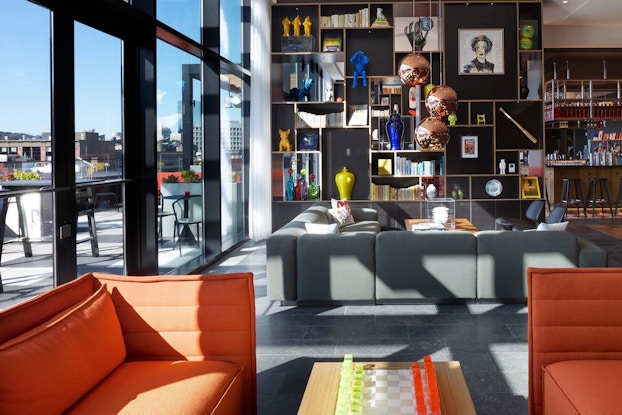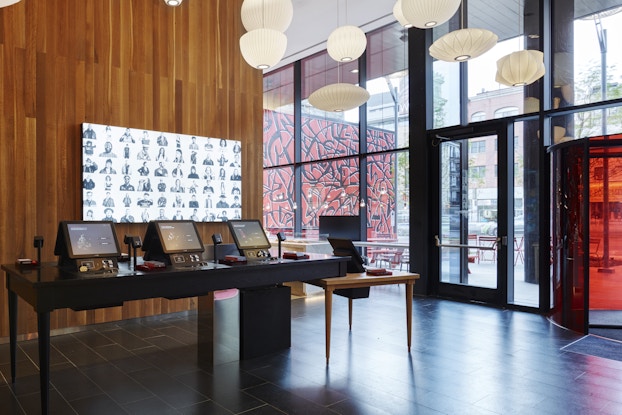
When iconic Chanel designer Karl Lagerfeld launched a collection of affordable frocks at fast-fashion retailer H&M in 2004, the moment held import for Rattan Chadha, then CEO of apparel chain Mexx.
As the retail veteran saw it, the democratization of luxury apparel had officially arrived.
At the time, Chadha was traipsing the globe to fashion trade shows with about 150 buyers and designers in tow. To keep costs down, his team ended up staying at uninspiring, nondescript hotels outside city centers.
Chadha wondered why the H&M/Lagerfeld-esque, affordable luxury trend hadn’t touched the hospitality sector. So in a lightbulb moment, he set out to change that.
The 2008 debut of citizenM in Amsterdam’s Schipol airport brought to market a hospitality concept that echoes WeWork’s hip, communal workplace vibe; taps the art and design world with gallery-like interiors, Vitra furniture and tony Italian linens; offers Uber-ish, tech-enabled conveniences like one-minute check-in and guest-personalized mood lighting — while nixing operationally costly hotel staples like restaurants, retail stores and massive staffs.
The result is an “affordable luxury” hotel chain with a self-service edge in bustling city centers, at room rates 35% to 55% below traditional luxury brands like the Four Seasons and The Ritz-Carlton, the company says, and an experience “that’s a million miles from a Hilton.”
Today, citizenM is on a mission to disrupt the hospitality sector by offering globetrotting, smartphone-tethered, culture-vulture-inclined business travelers struck by wanderlust, “the luxuries they want in great locations without breaking the bank,” Robin Chadha, chief marketing officer for the Dutch hotel group, and Rattan Chadha’s son, told CO—.
Now at 19 hotels in eight countries in North America, Asia and Europe, the brand is revving up the pace of expansion and entering new cities, as it readies the fall launch of an app designed to further boost guest conveniences.

Targeting ‘mobile citizens of the world’
CitizenM sees its target audience as “mobile citizens of the world,” hence the ‘m’ in its name.
“Our idea with citizenM was to create a hospitality brand that caters to a growing demographic, discerning travelers who are international, well-informed, social, and most importantly, value-conscious,” Chadha said.
They work in finance and media to design and tech, fluidly mixing high and low culture in how they dress, travel and play. The citizenM guest is that woman in a Zara dress clutching a Chanel handbag, and a man in a Gap T-shirt and a Rolex watch “that travels by train and drinks champagne,” he said.
The hotelier’s model reflects travelers’ evolving tastes, Libby Angst, a vice president in the restaurants, hospitality and leisure practice at global consultancy AlixPartners, told CO—. “Today, many travelers are seeking a centrally located, and authentic hotel experience at an affordable price. In exchange, they are willing to give up access to hotel amenities and services like an on-site spa, 24/7 in-room dining options, and extra square footage in the guest room.”
Our idea with citizenM was to create a hospitality brand that caters to a growing demographic, discerning travelers who are international, well-informed, social, and most importantly, value-conscious.Robin Chadha, chief marketing officer, citizenM
Convenience
Hotel chain citizenM is capitalizing on the consumer desire for convenience with its quick check-ins, affordable cost and useful amenities. Read on to learn what other things keep customers coming back.
And lots of millennials, she said, “are looking beyond the legacy brands to find unique and authentic hotel experiences where they have the opportunity to feel like a local.”
But it would be a mistake to label citizenM a millennial-geared hotel, according to Chadha. In fact, “I never use the term ‘millennial.’ We have some people over 50 and 60 and 25-year olds. If you’re young at heart, you love staying at citizenM,” he said.
As the experience economy has consumers spending less on tangible things and more on lived moments — from a theater jaunt and restaurant meal to an aerial yoga class — it’s amped up the pressure on businesses, particularly in the service sector, to make their brands immersive and distinct. “We’re living in an experiential era,” Chadha said. “How can we make a guest's experience at citizenM an integral, unforgettable part of their travel? The visual component comes into play here, making people want to capture and share their experiences — our emphasis on art [for one,] makes citizenM hotels not only feel unique, but look it.”
Slaying hotel pain points with mobile tech
With mobile tech powering the brand experience, citizenM is built on the premise that convenience is the ultimate luxury today.
And its model is designed in part to slay chronic pain points of hotel stays, while cutting out the traditional hotel elements that aren’t absolutely necessary, Chadha said. It’s based on feedback from focus groups that were asked: What frustrates you when you travel? And what’s important to you in a hotel? “Very simply, people hate waiting in line to check into a hotel,” he said, and in the booking process, myriad different room types from junior to luxury suites confound travelers.
citizenM found that guests who’d just brushed their teeth weren’t hankering for that artfully placed pillow chocolate, nor did they need that in-room robe and slippers. Restaurants, gift shops and room service were deemed expendable, too.
All told, “that’s a really big savings,” Chadha said. Armed with that data, the startup embarked on “designing a hotel for today’s traveler and what’s important to them.”
The hotel group discovered that today’s tech-savvy travelers expect a seamless experience, so, “we use technology to put power in the hands of our guests by making their stays not just comfortable, but efficient too,” Chadha said.
Guests check themselves in at kiosks, where they can also book their personalized breakfast order and floor preference. While that only takes about a minute, “We’re trying to make the process even smoother,” Chadha said. They can now also pre-check in by phone, and then scan a QR code at the lobby desk, which cuts the process to about 15 seconds, he said. Come October, the citizenM app will allow for complete mobile check-in and double as a room key for guests.
In citizenM’s “smart rooms,” guests personalize the vibe with “MoodPads.” From these “iPads with extra magic,” they can match the lighting to their blue, pink or orange mood, and remote control the room’s electronic windows and blinds.

Premium service with an egalitarian streak
Tech-enabled conveniences meet homey, artsy touches in citizenM’s lobbies, dubbed, “living rooms,” to its CanteenM kitchens, in a bid to deliver the comforts of home while serving modern workspace needs.
Lobbies feature Eames furniture, floor-to-ceiling books by literary notables — “specially selected contemporary art for fans of high culture, and big shiny televisions for fans of pop culture,” the hotel’s newspaper reads.
citizenM is designed in part to be a canvas for the Warhols of the art world as well as contemporary commissioned work, like Mark Titchner’s text-based banners at its London hotel.
At the same time, an egalitarian spirit informs the brand. Lobbies double as community-oriented workspaces, as “business nomads” who are not staying at the hotel are welcome to carve out their own office space for $15 a day.
Figuring that guests are more interested in being out and about exploring an area’s culinary spots than dining at an in-hotel restaurant, citizenM forgoes sit-down eateries for 24/7 food options that include a fresh local selection of sandwiches to sushi and salads. Guests help themselves to the food in a fully stocked refrigerator by scanning a card. “Maybe you want a beer or a croissant or pizza at midnight,” Chadha said. “It should be like a kitchen in your home.”

A low-cost model
As citizenM eschews traditional hotel employee roles, each location is staffed with “ambassadors” who do it all, from checking in guests to making a cocktail to recommending restaurants and whatever else a traveler might need. Despite the hotels’ pared-down staffs — its 230-room Times Square NYC location employs just six people, while a comparably sized hotel would employ 230 or more, “we ranked higher in service than the Four Seasons,” Chadha said.
The company also keeps costs down by owning its own real estate and the use of modular construction, where rooms are made in a factory before they’re shipped to a job site for assembly. “This owner-operator model has been very profitable, more or less, since day one,” Chadha said, “exceeding 50% of gross operating profit — which is unheard of in the industry."
The streamlined operating model, Chadha says, allows citizenM to swiftly adjust to market conditions and travelers’ behavior patterns. For example, after noticing that guests were watching their own content on mobile devices, the chain installed AppleTVs in all rooms in three months, so they could watch that curated content on a big screen.
It also allows for a nimble operation to offer guests a consistent-yet-distinct experience that’s all its own, Chadha said. “The music, the smell, the art, it’s quite a different product.” By contrast, removing a blindfold after being dropped in the lobby of a Marriott, Hilton or Sheraton, “you wouldn’t know where you were,” he said.
After opening two locations in 2017 and three in 2018, citizenM is stepping up the pace of expansion. Five hotels bowed this year in Boston, Kuala Lumpar, Shanghai, Switzerland and Amsterdam, and come 2020, new properties will debut in Los Angeles, San Francisco, Seattle and Washington D.C., and in Geneva and Paris abroad.
The hotel group expects to accelerate growth to about 10 new hotels a year. Market demand calls for it, Chadha said. Travelers, he said, “want luxury, but they don’t want to spend $700 per night.”
CO— aims to bring you inspiration from leading respected experts. However, before making any business decision, you should consult a professional who can advise you based on your individual situation.
CO—is committed to helping you start, run and grow your small business. Learn more about the benefits of small business membership in the U.S. Chamber of Commerce, here.

What can membership do for your business?
Gain tools to stay informed, competitive, and connected by becoming a U.S. Chamber of Commerce member. Membership gives you direct access to expert policy insights, economic updates, and exclusive resources designed to help your business thrive. From behind-the-scenes analysis from D.C. to exclusive discounts and expert support, U.S. Chamber membership helps you navigate change and seize new opportunities.







